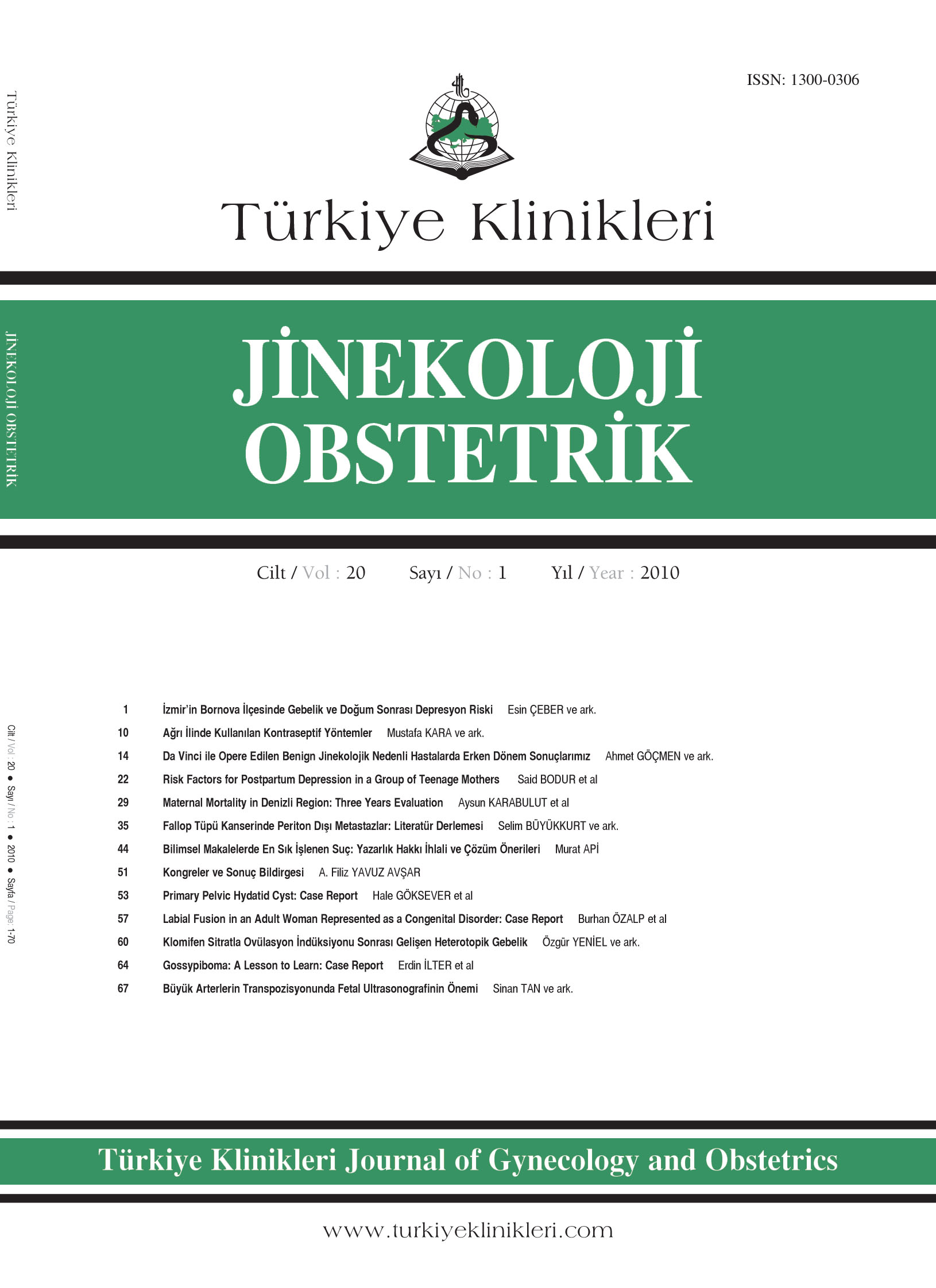Open Access
Peer Reviewed
ORIGINAL RESEARCH
3841 Viewed1418 Downloaded
Risk of Postnatal Depression and Pregnancy in Bornova, İzmir
İzmirin Bornova İlçesinde Gebelik ve Doğum Sonrası Depresyon Riski
Turkiye Klinikleri J Gynecol Obst. 2010;20(1):1-9
Article Language: TR
Copyright Ⓒ 2025 by Türkiye Klinikleri. This is an open access article under the CC BY-NC-ND license (http://creativecommons.org/licenses/by-nc-nd/4.0/)
ÖZET
Amaç: İzmir'in Bornova ilçesinde, gebelik ve doğum sonrası dönemdeki kadınlarda depresyon riskinin belirlenmesidir. Gereç ve Yöntemler: Tanımlayıcı tipteki araştırma, bölgedeki tüm sağlık ocaklarına (18 sağlık ocağı) kayıtlı 32-36 haftalık 327 gebe dahil edilmiş, örnekleme gidilmemiştir. Araştırma verilerini toplamada sosyo demografik soru formu ve Edinburgh Doğum Sonrası Depresyon Ölçeği (EDSDÖ) kullanılmıştır. Veriler iki aşamada toplanmıştır. Birinci aşamada, 32-36 haftalık gebelere sosyo demografik soru formu ve EDSDÖ uygulanmış, ikinci aşamada ise bu gebelerin 273'üne ulaşılarak doğumdan sonraki 4-8 haftada yalnızca EDSDÖ tekrar uygulanmıştır. Ulaşılan kadın oranı %83.5'tir. Bulgular: %37'si 25-29 yaş grubunda yer alan kadınların yaş ortalaması 26 ± 4.6 yıl olarak saptanmıştır. Doğum sonrası depresyon riski %22 olarak saptanmıştır. Kadınların doğum öncesi ve sonrası EDSDÖ puan ortalamaları arasındaki ilişki anlamlı bulunmuştur. Geniş aileye sahip olan gebeler, çekirdek aileye sahip olanlara göre 2.87 kat; gebeliğini istemeyenler isteyenlere göre 5 kat daha fazla depresyon riskine sahip bulunmuştur. Ruhsal yönden kendini kötü hisseden doğum yapmış annelerin de 2.63 kat daha fazla depresyon riski altında olduğu saptanmıştır. Sonuç: Gebelik depresyonu ve doğum sonu depresyon, anne-bebek-baba üçgeninin sağlıklı yaşamı için ihmal edilmemesi gereken bir ruh sağlığı sorunudur.
Amaç: İzmir'in Bornova ilçesinde, gebelik ve doğum sonrası dönemdeki kadınlarda depresyon riskinin belirlenmesidir. Gereç ve Yöntemler: Tanımlayıcı tipteki araştırma, bölgedeki tüm sağlık ocaklarına (18 sağlık ocağı) kayıtlı 32-36 haftalık 327 gebe dahil edilmiş, örnekleme gidilmemiştir. Araştırma verilerini toplamada sosyo demografik soru formu ve Edinburgh Doğum Sonrası Depresyon Ölçeği (EDSDÖ) kullanılmıştır. Veriler iki aşamada toplanmıştır. Birinci aşamada, 32-36 haftalık gebelere sosyo demografik soru formu ve EDSDÖ uygulanmış, ikinci aşamada ise bu gebelerin 273'üne ulaşılarak doğumdan sonraki 4-8 haftada yalnızca EDSDÖ tekrar uygulanmıştır. Ulaşılan kadın oranı %83.5'tir. Bulgular: %37'si 25-29 yaş grubunda yer alan kadınların yaş ortalaması 26 ± 4.6 yıl olarak saptanmıştır. Doğum sonrası depresyon riski %22 olarak saptanmıştır. Kadınların doğum öncesi ve sonrası EDSDÖ puan ortalamaları arasındaki ilişki anlamlı bulunmuştur. Geniş aileye sahip olan gebeler, çekirdek aileye sahip olanlara göre 2.87 kat; gebeliğini istemeyenler isteyenlere göre 5 kat daha fazla depresyon riskine sahip bulunmuştur. Ruhsal yönden kendini kötü hisseden doğum yapmış annelerin de 2.63 kat daha fazla depresyon riski altında olduğu saptanmıştır. Sonuç: Gebelik depresyonu ve doğum sonu depresyon, anne-bebek-baba üçgeninin sağlıklı yaşamı için ihmal edilmemesi gereken bir ruh sağlığı sorunudur.
ANAHTAR KELİMELER: Depresyon, doğum sonrası; gebelik
ABSTRACT
Objective: The purpose of this research was to examine the risk for depression during pregnancy and in the postnatal period in Bornova, Izmir. Material and Methods: This descriptive type of research was conducted with (n= 327) women who were between 32-36 weeks pregnancy and registered in 18 primary health clinics in region. No sampling method was used. The sociodemographic questionnaire and the Edinburgh Postnatal Depression Scale (EPDS) were used in the research. The data were obtained in two phases. In the first phase the sociodemographic questionnaire and EPDS were administered to women in their 32nd-36th week of pregnancy. The second phase took place four to eight weeks postnatal when the women were administered the EPDS again. Of all the women 83.5% were reached. Results: 37% of the women were in the 25-29 years old age group and their mean age was 26 ± 4.6. It was determined that 22% of the women were at risk of postnatal depression. The relationship between the womens prenatal and postnatal EPDS score means were found. Pregnant who had extended families had a 2.87 times greater risk for depression than those in nuclear families, and women who did not want their pregnancy had a 5.00 times greater risk than those who did. Women who had delivered a child felt bad emotionally had a 2.63 times greater risk for depression. Conclusion: Depression in pregnancy and postnatal depression are mental health problems that should not be ignored for a healthy mother-infant-father triangle.
Objective: The purpose of this research was to examine the risk for depression during pregnancy and in the postnatal period in Bornova, Izmir. Material and Methods: This descriptive type of research was conducted with (n= 327) women who were between 32-36 weeks pregnancy and registered in 18 primary health clinics in region. No sampling method was used. The sociodemographic questionnaire and the Edinburgh Postnatal Depression Scale (EPDS) were used in the research. The data were obtained in two phases. In the first phase the sociodemographic questionnaire and EPDS were administered to women in their 32nd-36th week of pregnancy. The second phase took place four to eight weeks postnatal when the women were administered the EPDS again. Of all the women 83.5% were reached. Results: 37% of the women were in the 25-29 years old age group and their mean age was 26 ± 4.6. It was determined that 22% of the women were at risk of postnatal depression. The relationship between the womens prenatal and postnatal EPDS score means were found. Pregnant who had extended families had a 2.87 times greater risk for depression than those in nuclear families, and women who did not want their pregnancy had a 5.00 times greater risk than those who did. Women who had delivered a child felt bad emotionally had a 2.63 times greater risk for depression. Conclusion: Depression in pregnancy and postnatal depression are mental health problems that should not be ignored for a healthy mother-infant-father triangle.
MENU
POPULAR ARTICLES
MOST DOWNLOADED ARTICLES





This journal is licensed under a Creative Commons Attribution-NonCommercial-NoDerivatives 4.0 International License.










